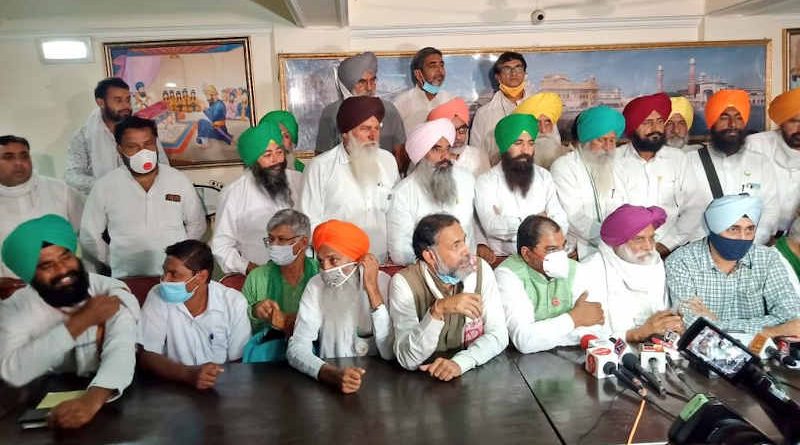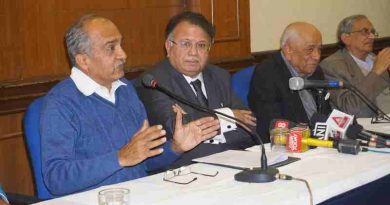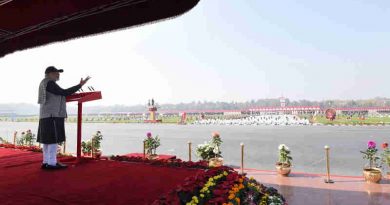Farm Laws: Farmers Must Not Hold Closed-Door Meetings with Modi Govt

There should be a greater transparency in the farm leaders’ dealings with the government. They should demand that all their meetings with the government should be recorded and live-streamed.
By Rakesh Raman
As the discussion between farmers’ unions and the government failed Tuesday (December 1), the impasse over the contentious farm laws continues. Agriculture minister Narendra Tomar, his Cabinet colleague Piyush Goyal, and an industry minister Som Parkash had met the 35-member farmers’ team.
Hundreds of thousands of Indian farmers are protesting in New Delhi since November 27 against the new farm laws introduced by the government headed by Prime Minister (PM) Narendra Modi.
Although farmers across the nation oppose Modi government’s decision, the movement is being led by farmers of Punjab, an Indian state which contributes the lion’s share to the Indian agriculture sector.
Farmers fear that these laws – which are being imposed under the garb of agricultural reforms by the government – will deprive them of their farming rights and they will lose their lands which will be grabbed by Modi’s capitalist friends. They expect the government to withdraw these laws.
But the Modi government has categorically refused to repeal the laws and this decision was reiterated by the government ministers in the meeting with farmers on December 1.
As the Modi government has nothing to lose, it has simply ignored the fact that farmers – many with their families including women and children – are staying on the open roads to protest in Delhi’s cold weather.
Farmers do not understand that the government is wasting time in useless discussions because the government knows that it will be almost impossible for farmers to sustain their agitation for a longer period.
In fact, now no discussion is required because farmers have demanded that the government should simply take back the farm laws. Now, the government has to communicate its decision for which meeting with the farmers is not needed.
Although protesting farmers show overconfidence in their struggle and hope to win, they are so naive in their approach that soon they may have to end their agitation without getting anything significant from the government.
DIRECTIONLESS PROTESTS
Farmers are running totally directionless protests wherein they have not even defined their demands clearly and have not chalked out the roadmap to take their campaign forward. They are only parroting that the government should cancel the farm laws.
But even if the government decides to cancel the laws, it will take plenty of time to complete the process. If the farmers accept the government’s promise that it will suspend or stop the implementation of these laws, should farmers end their protest immediately?
Unfortunately, all these issues are not clear. As most farmers are uneducated, they do not understand various aspects of messaging and mass communications which are required to lead intellectual campaigns.
Rural Resistance: Protests by Farmers in India
This article is part of our exclusive editorial section “Rural Resistance: Protests by Farmers in India”. You can click the following link to visit this section.
[ Rural Resistance: Protests by Farmers in India ]
It is said that nearly 500 farm organizations – representing millions of farmers – are participating in the campaign against the new farm laws. Farmers belonging to nearly 250 farm organizations are running their struggle only under the banner of All India Kisan Sangharsh Coordination Committee (AIKSCC) which is an umbrella organization of farmers.
But the fact is that all these farm organizations do not have a communications strategy. They do not even have a central website to regularly inform about their activities and campaign in multiple languages to draw global attention to their struggle.
All their interactions with their own people and with the government representatives are being held in an ad hoc manner. While farm leaders are blindly accepting the calls of the government to hold meaningless meetings in government offices, there is no record of their meetings.
Some farmers fear that the farm leaders who are going regularly to meet the ministers may be lured by the government with some surreptitious reward to end their struggle without any significant outcome.
Therefore, there should be a greater transparency in the farm leaders’ dealings with the government. For instance, AIKSCC and other farm leaders should not hold closed-door meetings with the government.
Rather, they should demand that all their meetings with the government should be recorded and live-streamed. They can also hold virtual meetings instead of going to the government offices. The next meeting between farmers and the government is scheduled to take place tomorrow (December 3).
Moreover, AIKSCC or any other farm union should make a modern interactive website in different languages (such as English, Hindi, and Punjabi) and update it regularly after taking daily feedback from all stakeholders in India and abroad.
Farmers must understand that the social media sites such as Twitter, Facebook, and YouTube are not effective channels of communications for long-term campaigns because they can host only curt and volatile content. Plus, these sites cannot be fully trusted.
If farmers want to win this battle against some of the most despotic leaders in the world, they need to run a modern, multidimensional campaign that should have adequate intellectual components in it.
By Rakesh Raman, who is a national award-winning journalist and social activist. He is the founder of a humanitarian organization RMN Foundation which is working in diverse areas to help the disadvantaged and distressed people in the society.





